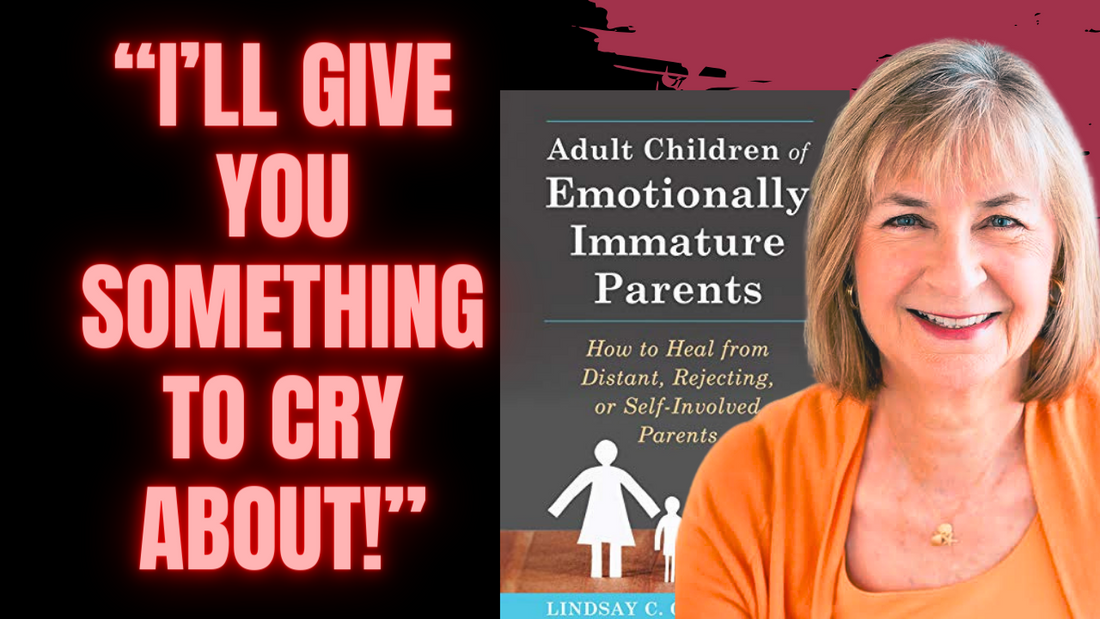
I'll Give You Something To Cry About - Emotionally Immature Parents
Share
Many adults find themselves grappling with the lasting effects of being raised by emotionally immature parents. Such parents often struggle to empathize with others or see beyond their own immediate experiences, a condition that can significantly impact their children throughout their lives. Drawing upon the insights of psychologist Lindsay C. Gibson, this article will explore the nuances of dealing with emotionally immature parents and offers practical advice for healing and personal growth.
Understanding Emotional Immaturity
Emotional immaturity in parents can manifest as a lack of empathy, difficulty in handling emotions, or an inability to appreciate the emotional needs of others. These parents often react defensively to criticism and are unable to engage in mature discussions about feelings or past hurts. Their emotional "learning disability" means they process interactions very differently, making communication about emotional topics particularly challenging. Understanding these patterns is the first step in mitigating their impact, helping you anticipate and prepare for potential challenges in interactions.
The Impact of Tough Love
Children raised under the guise of tough love often learn to equate love with endurance of hardship. They may develop resilience as a necessary survival trait, but this can come at the cost of emotional openness. The tough exterior required to cope with such an upbringing might protect them from immediate pain but can also hinder their ability to form intimate relationships in adulthood. Over time, this can lead to a cycle of emotional suppression, people-pleasing tendencies and difficulty in expressing vulnerability, all key components of deep, meaningful relationships.
Coping with Contradictory Feelings
It's natural to harbor complex and sometimes conflicting feelings towards one's parents. Love, resentment, admiration, and disappointment can coexist, making the emotional landscape particularly difficult to navigate. Recognizing and acknowledging these feelings is crucial in understanding one’s emotional responses and triggers. This dual awareness can foster a more nuanced understanding of personal emotional states and lead to healthier ways of managing interactions with parents and others.
Strategies for Healing and Growth
- Self-awareness and education: Learning about emotional immaturity helps in recognizing patterns and understanding the root of many conflicted emotions. Uncovering why we feel the way we feel, and self-validating the experiences that led us there, empowers us to break cycles of negative behavior and unconscious impulses.
- Setting boundaries: Establishing and maintaining healthy boundaries, as outlined in Dr. Gibson's book Recovering From Emotionally Immature Parents is essential for personal well-being and defining the dynamics of the relationship moving forward. Boundaries help protect your emotional space and can serve as a guideline for interactions, ensuring that they remain respectful and constructive.
- Seeking community: Be it an interest group, a book club, or a few close friends, engaging with a community of like-minded people allows us a safe space to practice authenticity and feel appreciated for who we were always meant to be.
- Fostering self-compassion: Being kind to oneself and recognizing one’s needs can help mitigate feelings of guilt or inadequacy that may arise from challenging family dynamics. Self-compassion encourages a forgiving outlook towards oneself, easing the internal pressures that may build from familial expectations.
Conclusion
Dealing with emotionally immature parents is a profound challenge that requires patience, understanding, and proactive management of one’s mental and emotional health. If you'd like to delve deeper into understanding and overcoming the challenges posed by such upbringings, the Emotionally Immature Parents Masterpack is the world's premiere resource for it, created in collaboration with Lindsay C. Gibson. This comprehensive toolkit is designed to aid in the process of healing, offering strategies, insights, and guidance tailored for adults navigating these complex familial waters.
